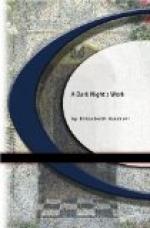For a long time Ellinor sat still; now and then taking up Miss Monro’s letter, and re-reading the few terrible details. Then she bethought her that possibly the canon might have brought a copy of the Times, containing the examination of Dixon before the magistrates, and she opened the door and called to a passing servant to make the inquiry. She was quite right in her conjecture; Dr. Livingstone had had the paper in his pocket during his interview with her; but he thought the evidence so conclusive, that the perusal of it would only be adding to her extreme distress by accelerating the conviction of Dixon’s guilt, which he believed she must arrive at sooner or later.
He had been reading the report over with Mrs. Forbes and her daughters, after his return from Ellinor’s room, and they were all participating in his opinion upon it, when her request for the Times was brought. They had reluctantly agreed, saying there did not appear to be a shadow of doubt on the fact of Dixon’s having killed Mr. Dunster, only hoping there might prove to be some extenuating circumstances, which Ellinor had probably recollected, and which she was desirous of producing on the approaching trial.
CHAPTER XIII.
Ellinor, having read the report of Dixon’s examination in the newspaper, bathed her eyes and forehead in cold water, and tried to still her poor heart’s beating, that she might be clear and collected enough to weigh the evidence.
Every line of it was condemnatory. One or two witnesses spoke of Dixon’s unconcealed dislike of Dunster, a dislike which Ellinor knew had been entertained by the old servant out of a species of loyalty to his master, as well as from personal distaste. The fleam was proved beyond all doubt to be Dixon’s; and a man, who had been stable-boy in Mr. Wilkins’s service, swore that on the day when Mr. Dunster was missed, and when the whole town was wondering what had become of him, a certain colt of Mr. Wilkins’s had needed bleeding, and that he had been sent by Dixon to the farrier’s for a horse-lancet, an errand which he had remarked upon at the time, as he knew that Dixon had a fleam of his own.
Mr. Osbaldistone was examined. He kept interrupting himself perpetually to express his surprise at the fact of so steady and well-conducted a man as Dixon being guilty of so heinous a crime, and was willing enough to testify to the excellent character which he had borne during all the many years he had been in his (Mr. Osbaldistone’s) service; but he appeared to be quite convinced by the evidence previously given of the prisoner’s guilt in the matter, and strengthened the case against him materially by stating the circumstance of the old man’s dogged unwillingness to have the slightest interference by cultivation with that particular piece of ground.




